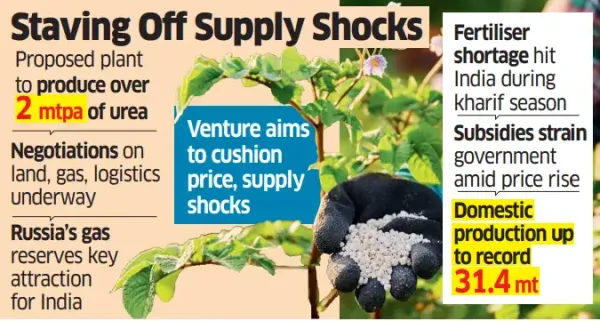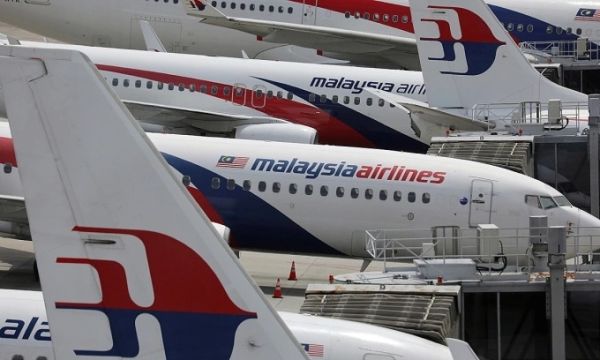
New Delhi: Indian fertiliser companies are preparing to establish a urea manufacturing facility in Russia, which has abundant reserves of the required raw materials such as ammonia and natural gas, to ensure a steady supply of the key agricultural input and reduce exposure to volatile global prices, according to people with knowledge of the matter. This will be the country's first such venture in Russia.
Rashtriya Chemicals and Fertilisers (RCF) and National Fertilisers Ltd (NFL), both state-owned, along with Indian Potash Ltd (IPL)-a government-backed but privately owned firm-have signed a non-disclosure agreement (NDA) with Russian companies to begin work on the project, said the people cited.
The proposed venture is expected to be announced during President Vladimir V Putin's visit to India in December, they said.
The plant is likely to produce more than 2 million tonnes of urea annually, said one of the persons. The partners are negotiating details such as land allocation, natural gas and ammonia pricing, and transportation logistics. "We are seeing sincerity and alignment on both sides," said one of the persons.

The companies didn't respond to queries.
Russia has ample reserves of natural gas and ammonia, which are scarce in India.
Deepening Ties with Moscow
This makes India entirely dependent on imports even for domestic manufacturing.
The Russian venture is designed to insulate India from future price shocks and supply disruptions, while deepening bilateral economic ties between the two countries that have strengthened cooperation in energy, defence and now agribusiness.
The project comes after India faced an acute fertiliser shortage during this year’s kharif (monsoon) planting season, when China temporarily halted exports of urea and other soil nutrients. Stocks of urea, diammonium phosphate and specialty fertilisers were depleted.
That disruption forced India to source supplies from alternative markets at significantly higher prices, straining budgets and causing concerns about food production.
This year’s well-distributed monsoon has pushed fertiliser demand higher, as farmers have increased acreage under nutrient-intensive crops such as maize. The demand for soil nutrition will rise during the rabi (winter) season when farmers cultivate wheat, which is a nutrient-intensive crop.
Urea is an important bulk fertiliser used for all plants and crops to increase productivity. Fertilisers in India are controlled by the government to ensure they are affordable and available to farmers, supporting national food security and agricultural productivity. This is achieved through subsidies to lower prices and regulating distribution to ensure equitable access and prevent hoarding. A sudden rise in global prices increases the subsidy burden of the government.
The FY25 final budget allocation to the Department of Fertilisers increased to ₹1.92 lakh crore, up from the initial estimate of Rs1.68 lakh crore. India imported six times more urea in September compared with the same month last year in order to ensure stocks would be enough.
India's domestic urea production has significantly increased, reaching a record 31.4 million tonnes in FY24, driven by the commissioning of six new plants by companies such as Hindustan Urvarak & Rasayan Ltd (HURL), Chambal Fertilisers & Chemicals, Matix Fertilisers & Chemicals and Ramagundam Fertilisers & Chemicals Ltd (RFCL).
The cabinet has also approved the setting up of a urea plant in Assam at an estimated cost of Rs 10,601.4 crore. However, India is still heavily dependent on imports for raw materials. India is the second-largest user and the third-largest producer of fertilisers globally.
Rashtriya Chemicals and Fertilisers (RCF) and National Fertilisers Ltd (NFL), both state-owned, along with Indian Potash Ltd (IPL)-a government-backed but privately owned firm-have signed a non-disclosure agreement (NDA) with Russian companies to begin work on the project, said the people cited.
The proposed venture is expected to be announced during President Vladimir V Putin's visit to India in December, they said.
The plant is likely to produce more than 2 million tonnes of urea annually, said one of the persons. The partners are negotiating details such as land allocation, natural gas and ammonia pricing, and transportation logistics. "We are seeing sincerity and alignment on both sides," said one of the persons.

The companies didn't respond to queries.
Russia has ample reserves of natural gas and ammonia, which are scarce in India.
Deepening Ties with Moscow
This makes India entirely dependent on imports even for domestic manufacturing.
The Russian venture is designed to insulate India from future price shocks and supply disruptions, while deepening bilateral economic ties between the two countries that have strengthened cooperation in energy, defence and now agribusiness.
The project comes after India faced an acute fertiliser shortage during this year’s kharif (monsoon) planting season, when China temporarily halted exports of urea and other soil nutrients. Stocks of urea, diammonium phosphate and specialty fertilisers were depleted.
That disruption forced India to source supplies from alternative markets at significantly higher prices, straining budgets and causing concerns about food production.
This year’s well-distributed monsoon has pushed fertiliser demand higher, as farmers have increased acreage under nutrient-intensive crops such as maize. The demand for soil nutrition will rise during the rabi (winter) season when farmers cultivate wheat, which is a nutrient-intensive crop.
Urea is an important bulk fertiliser used for all plants and crops to increase productivity. Fertilisers in India are controlled by the government to ensure they are affordable and available to farmers, supporting national food security and agricultural productivity. This is achieved through subsidies to lower prices and regulating distribution to ensure equitable access and prevent hoarding. A sudden rise in global prices increases the subsidy burden of the government.
The FY25 final budget allocation to the Department of Fertilisers increased to ₹1.92 lakh crore, up from the initial estimate of Rs1.68 lakh crore. India imported six times more urea in September compared with the same month last year in order to ensure stocks would be enough.
India's domestic urea production has significantly increased, reaching a record 31.4 million tonnes in FY24, driven by the commissioning of six new plants by companies such as Hindustan Urvarak & Rasayan Ltd (HURL), Chambal Fertilisers & Chemicals, Matix Fertilisers & Chemicals and Ramagundam Fertilisers & Chemicals Ltd (RFCL).
The cabinet has also approved the setting up of a urea plant in Assam at an estimated cost of Rs 10,601.4 crore. However, India is still heavily dependent on imports for raw materials. India is the second-largest user and the third-largest producer of fertilisers globally.








